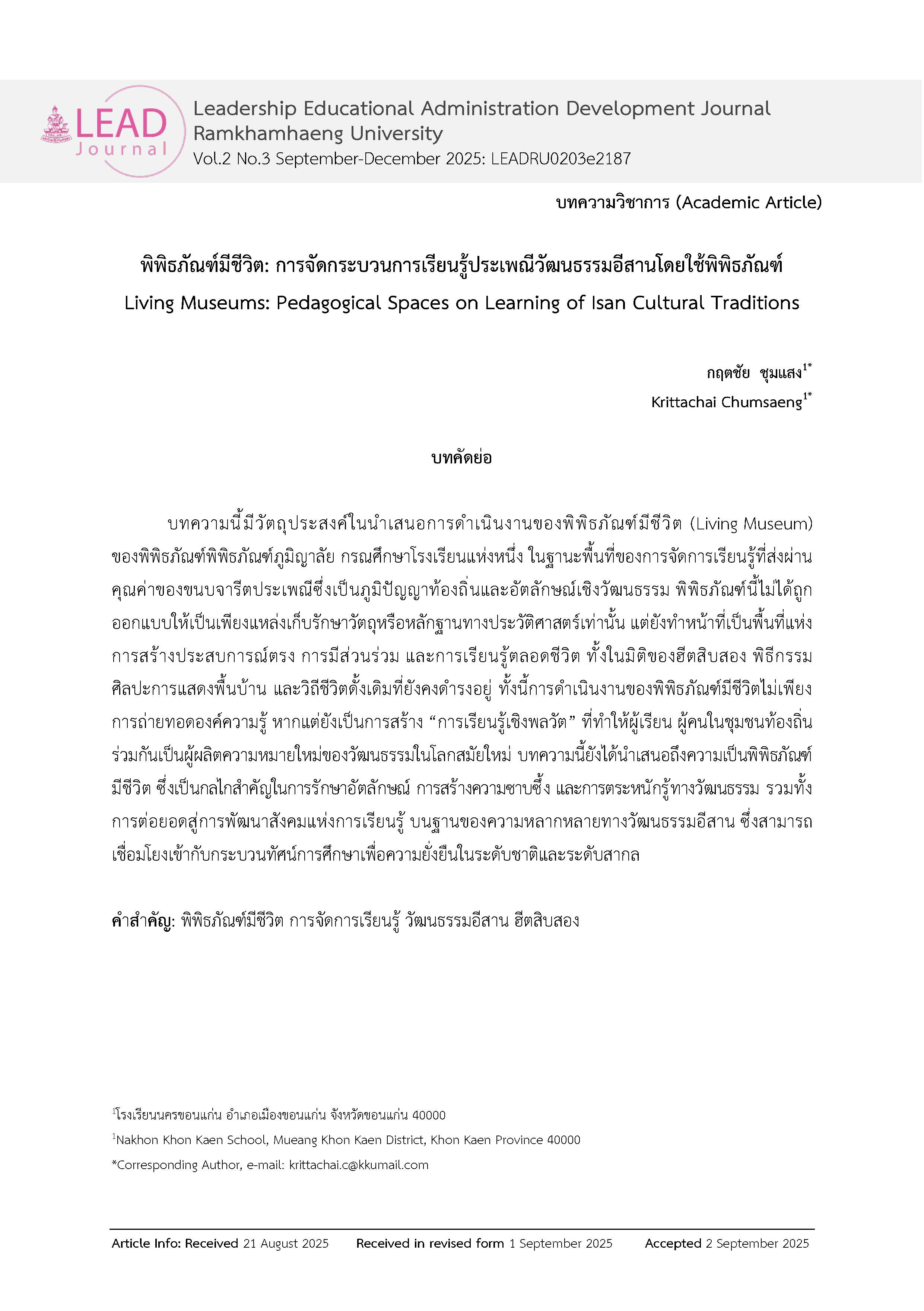พิพิธภัณฑ์มีชีวิต: การจัดกระบวนการเรียนรู้ประเพณีวัฒนธรรมอีสานโดยใช้พิพิธภัณฑ์
Main Article Content
บทคัดย่อ
บทความนี้มีวัตถุประสงค์ในนำเสนอการดำเนินงานของพิพิธภัณฑ์มีชีวิต (Living Museum) ของพิพิธภัณฑ์พิพิธภัณฑ์ภูมิญาลัย กรณศึกษาโรงเรียนแห่งหนึ่ง ในฐานะพื้นที่ของการจัดการเรียนรู้ที่ส่งผ่านคุณค่าของขนบจารีตประเพณีซึ่งเป็นภูมิปัญญาท้องถิ่นและอัตลักษณ์เชิงวัฒนธรรม พิพิธภัณฑ์นี้ไม่ได้ถูกออกแบบให้เป็นเพียงแหล่งเก็บรักษาวัตถุหรือหลักฐานทางประวัติศาสตร์เท่านั้น แต่ยังทำหน้าที่เป็นพื้นที่แห่งการสร้างประสบการณ์ตรง การมีส่วนร่วม และการเรียนรู้ตลอดชีวิต ทั้งในมิติของฮีตสิบสอง พิธีกรรม ศิลปะการแสดงพื้นบ้าน และวิถีชีวิตดั้งเดิมที่ยังคงดำรงอยู่ ทั้งนี้การดำเนินงานของพิพิธภัณฑ์มีชีวิตไม่เพียงการถ่ายทอดองค์ความรู้ หากแต่ยังเป็นการสร้าง “การเรียนรู้เชิงพลวัต” ที่ทำให้ผู้เรียน ผู้คนในชุมชนท้องถิ่นร่วมกันเป็นผู้ผลิตความหมายใหม่ของวัฒนธรรมในโลกสมัยใหม่ บทความนี้ยังได้นำเสนอถึงความเป็นพิพิธภัณฑ์มีชีวิต ซึ่งเป็นกลไกสำคัญในการรักษาอัตลักษณ์ การสร้างความซาบซึ้ง และการตระหนักรู้ทางวัฒนธรรม รวมทั้งการต่อยอดสู่การพัฒนาสังคมแห่งการเรียนรู้ บนฐานของความหลากหลายทางวัฒนธรรมอีสาน ซึ่งสามารถเชื่อมโยงเข้ากับกระบวนทัศน์การศึกษาเพื่อความยั่งยืนในระดับชาติและระดับสากล
Downloads
Article Details

อนุญาตภายใต้เงื่อนไข Creative Commons Attribution-NonCommercial-NoDerivatives 4.0 International License.
The authors are solely accountable for the ideas and recommendations articulated in the articles published in The LEAD Journal RU. Should there be any inaccuracies, the authors accept full responsibility for such errors.
Moreover, the Editorial Board, Editorial Team, and Committee of The LEAD Journal RU are committed to maintaining the integrity of the principles reflected in the authors' contributions.
Consequently, Ramkhamhaeng University, the Editorial Board, Editorial Team, and Editors shall not be held liable for any outcomes arising from the authors' presentation of their ideas and recommendations within The LEAD Journal RU.
เอกสารอ้างอิง
Appadurai, A. (1996). Modernity at large: Cultural dimensions of globalization. Minneapolis: University of Minnesota Press.
Arnstein, S. R. (1969). A Ladder of Citizen Participation. Journal of the American Institute of Planners, 35(4), 216-224.
Bourdieu, P. (1986). The Forms of Capital. In J. Richardson (Ed.), Handbook of Theory and Research for the Sociology of Education (pp. 241-258). New York: Greenwood Press
Chumsaeng, C. (2023). The Development of the Multiple Intelligences of Students Using Community-based Learning
Management: A Case Study of the Creation of the Youth Drama Hed Dee at Nakhon Khon Kaen School, Khon Kaen Province. Journal of Humanities, Social Sciences, and Education, Mahidol University, 6(2), 263-298. [In Thai].
Falk, J. H., and Dierking, L. D. (2013). The Museum Experience Revisited. New York: Routledge.
Hobsbawm, E. J., and Ranger, T. (Eds.). (1983). The Invention of Tradition. Cambridge: Cambridge University Press.
Jerawang, C. (2020). Local Museum Management with Community Participation and Development: A Case Study of Khun Lahar Local Museum. (Independent Study, Thammasat University). [In Thai].
Jutagate, A. (2014). Community Participation in Learning Management of the Bangkok Local Museums. Veridian E-Journal, 7(3), 1113-1124. [In Thai].
Kaochim, T., Sinthuboon, K., ..., and Rakpan, K. (2024). Living Museum Design Guidance for Cultural Tourism: Inthakhin Community, Mae Taeng, Chiang Mai. Genesha Journal, 20(2), 183-197. [In Thai].
Kolb, D. A. (2015). Experiential Learning: Experience as the Source of Learning and Development. (2nd ed.). New Jersey: Pearson Education, Inc.
Nadprasert, P., Boriboon, G., and Sungsri, S. (2017). Management of Local Museums to Promote Lifelong Learning. Veridian E-Journal, 10(2), 861-878. [In Thai].
Nakhon Khon Kaen School. (2021). Report on the Implementation of the Third Month Merit-making Ceremony, Boon Khao Jee. Khon Kaen: Nakhon Khon Kaen School. [In Thai].
Panyachit, S. (2019). Local Museum: The Role of Arts, Culture and Sustainable Development. Journal of Fine and Applied Arts, Srinakharinwirot University, 23(2), 113-128. [In Thai].
Phunwoon, P. and Soontayatron, S. (2019). Perception of Cultural Identity, Uniqueness, and Symbol Affecting the Mon's Awareness Towards Socio-cultural Impacts of Tourism in
Ko Kret, Thailand. Journal of Sports Science and Health, 20(2), 151-165. [In Thai].
Pinkosol, S. (2017). Museum Management for Learning: A Case Study of Bangkok Folk's Museum. (Master's Thesis, Burapha University). [In Thai].
Pluemsamrungit, P. and Wilaikum, F. (2018). Museum: Learning Resources for Developing Learners in the 21st Century. T.L.A. Bulletin, 62(1), 43-67. [In Thai].
Ruso, L. and Topdal, E. B. (2014). The Use of Museums for Educational Purposes Using the Drama Method. Procedia-Social and Behavioral Sciences, 141(2014), 628–632
Simok, S. (2023). Development of Community Learning Resources based on Local Wisdom on Religion and Traditions by Emphasizing the Cooperation of Communities. Academic Journal for the Humanities and Social Sciences Dhonburi Rajabhat University, 6(3), 1-13. [In Thai].
Tahom, U. and Senarat, S. (2018). Application of Cultural Capital and Local Community Development in the Northeastern Region. Journal of Buddhist Studies Vanam Dongrak, 5(1), 15-24. [In Thai].
Uztemur, S., Dinc, E., and Acun, I. (2019). Teaching Social Studies in Historic Places and Museums: An Activity-based Action Research. International Journal of Research in Education and Science, 5(1), 251-271.
Vallibhotama, S. (2018). Museums and Local History: A Collaborative Learning Process. Bangkok: Lek-Prapai Viriyapant Foundation. [In Thai].
Vygotsky, L. S. (1978). Mind in Society: The Development of Higher Psychological Processes. Cambridge: Harvard University Press.


